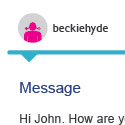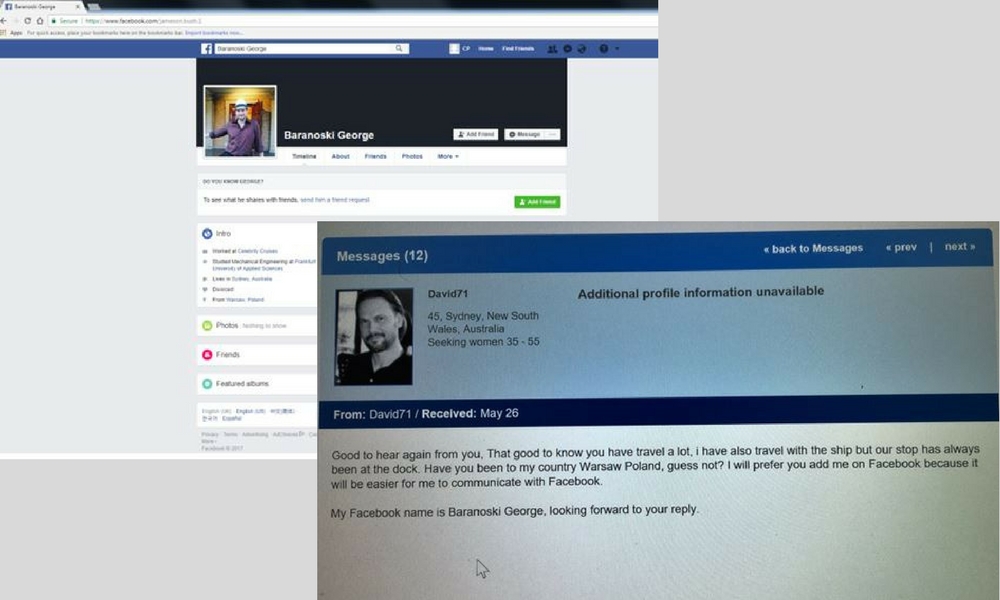Dating and romance scams often take place through online dating websites, but scammers may also use social media or email to make contact. They have even been known to telephone their victims as a first introduction. These scams are also known as ‘catfishing’.


Scammers typically create fake online profiles designed to lure you in. They may use a fictional name, or falsely take on the identities of real, trusted people such as military personnel, aid workers or professionals working abroad.
Dating and romance scammers will express strong emotions for you in a relatively short period of time, and will suggest you move the relationship away from the website to a more private channel, such as phone, email or instant messaging. They often claim to be from Australia or another western country, but travelling or working overseas.
Scammers will go to great lengths to gain your interest and trust, such as showering you with loving words, sharing ‘personal information’ and even sending you gifts. They may take months to build what may feel like the romance of a lifetime and may even pretend to book flights to visit you, but never actually come.
Once they have gained your trust and your defences are down, they will ask you (either subtly or directly) for money, gifts or your banking/credit card details. They may also ask you to send pictures or videos of yourself, possibly of an intimate nature.
Often the scammer will pretend to need the money for some sort of personal emergency. For example, they may claim to have a severely ill family member who requires immediate medical attention such as an expensive operation, or they may claim financial hardship due to an unfortunate run of bad luck such as a failed business or mugging in the street. The scammer may also claim they want to travel to visit you, but cannot afford it unless you are able to lend them money to cover flights or other travel expenses.
Sometimes the scammer will send you valuable items such as laptop computers and mobile phones, and ask you to resend them somewhere. They will invent some reason why they need you to send the goods but this is just a way for them to cover up their criminal activity. Alternatively they may ask you to buy the goods yourself and send them somewhere. You might even be asked to accept money into your bank account and then transfer it to someone else.
Warning - the above scenarios are very likely to be forms of money laundering which is a criminal offence. Never agree to transfer money for someone else.
Sometimes the scammer will tell you about a large amount of money or gold they need to transfer out of their country, and offer you a share of it. They will tell you they need your money to cover administrative fees or taxes.
Dating and romance scammers can also pose a risk to your personal safety as they are often part of international criminal networks. Scammers may attempt to lure their victims overseas, putting you in dangerous situations that can have tragic consequences.
Regardless of how you are scammed, you could end up losing a lot of money. Online dating and romance scams cheat Australians out of millions every year. The money you send to scammers is almost always impossible to recover and, in addition, you may feel long-lasting emotional betrayal at the hands of someone you thought loved you.
Reverse image searching
One way to find out whether a person's profile picture has been used elsewhere is to do a reverse image search. You can do this via Google images by clicking on the camera icon on the desktop version of the site’s search bar. Alternatively you can use Tin Eye. A reverse image search can help you identify if the image has been taken from someone else, or belongs to a few people with different names.
List of Scams
-

Fake profiles: Captain Thomas Steve
Read More...A WA woman has lost more than $10,000 in an online romance scam after a fraudster used stolen social media images to pose as a ship captain called ‘Thomas Steve’.
-

George Baranoski Fake Dating and Facebook Profile
Read More...WA ScamNet received a recent report from a lady who lost $109,000 to a scammer after using the match.com dating website. After starting up an online conversation with David71, he said his name was George Baranoski and asked her to chat with him on Facebook rather than the dating website.
-

Tony Walter fake facebook profile
Read More...Scammers are using images of an American public figure to set up fake dating and social media profiles under the name Tony Walter.




